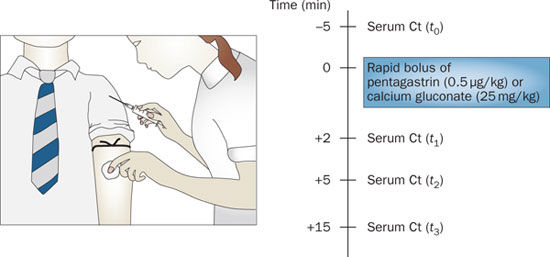Medullary thyroid cancer can be highly aggressive, especially if the diagnosis is done in advanced stages. Early diagnosis is based on RET genetic testing, for familial forms, and on the routine measurement of calcitonin (Ct). Nevertheless, since false-positive results can be obtained with the basal measurement of Ct, a provocative test to evaluate stimulated Ct is often needed. Pentagastrin which has been widely used to stimulate basal Ct, especially in European countries, is now hardly available. Thus, the stimulation with calcium (Ca), used in the 1970s-1980s and then abandoned for around 30 years, has recently elicited more interest. In the past 3 years, studies in patients and normal controls have demonstrated that the stimulation with Ca (2.3-2.5 mg/kg of elemental Ca, corresponding to 25 mg/kg of Ca gluconate) is highly potent and accurate. Novel gender-related cut-offs have been proposed for the Ca test, though the analysis of additional large series is predicted to modify these preliminary data. Finally, Ca seems to be the test of choice to stimulate Ct for the diagnosis and follow-up of medullary thyroid cancer, also because it is widely available, has a low cost and it is associated with a low number and intensity of side effects. In the present review the different methods to stimulate Ct and the cut-offs for the identification of the hyperplastic/neoplastic transformation of the C cells will be reported and discussed.



 Contact Us
Contact Us







 Hospitals
Hospitals
 Doctors
Doctors
 Diagnostic
Diagnostic
 Pharmacy
Pharmacy
 Health Tips
Health Tips
 Blog
Blog

























Comments